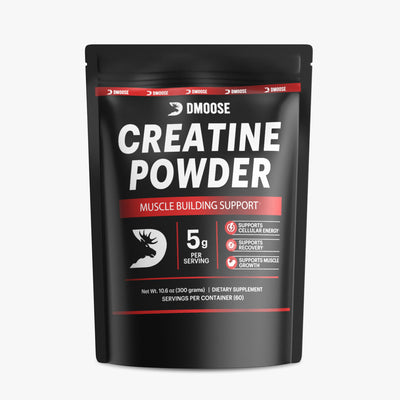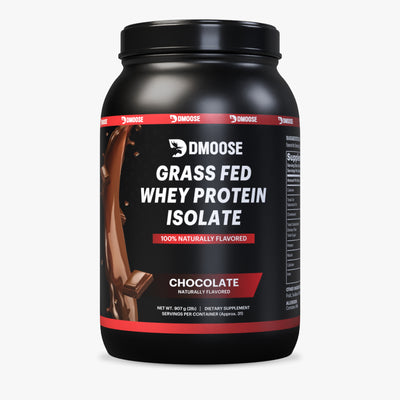Feeling stuck in your workout routine? You push yourself harder every day, but it feels like you’re just not getting the results you deserve.
Maybe your strength is plateauing, recovery takes longer than you’d like, or those extra reps seem impossible.
It’s frustrating, but here’s the good news: DMoose offers the best Creatine Monohydrate. This isn’t just another supplement; it’s the extra edge you need to crush your limits, recover faster, and see real progress.
If you’re ready to stop spinning your wheels and finally break through, keep reading to discover how creatine powder can give you the boost you’ve been looking for.
What Is Creatine Monohydrate?

Think of creatine monohydrate as your cheat code for muscle gains. It’s a supplement made of naturally occurring Creatine and a water molecule. Your body already produces it, but adding more can ramp up muscle function.
It’s like adding strength to your daily routine, like Popeye and his spinach! Creatine, primarily found in muscles, fuels your workouts with quick energy during high-intensitysessions. Creatine’s got your back!
As it moves through your body, creatine also boosts your metabolism and shields your cells as an antioxidant. Time to give Creatine the credit it deserves!
Different Types of Creatine Monohydrate Supplements
When it comes to creatine monohydrate supplements, you've got options! Choose your fighter: capsules or powders. Capsules are easy to swallow with your favorite drink or food, while powders are perfect for a shake-up on the go.
Creatine Monohydrate Capsules
Capsules offer a convenient and mess-free way to take creatine. Just pop them with water or your meal, and you're good to go!
Creatine Monohydrate Powder
Powdered creatine is versatile and can be mixed with shakes or water. It's the go-to choice for quick absorption and flexibility.
Other Types of Creatine
Types like creatine pyruvate, nitrate, and ethyl ester exist, but creatine monohydrate remains the most studied and effective form. Stick to the classic for the best results.
Health Benefits of Creatine Monohydrate

Want to pack on some muscle and be a high-performance athlete? Meet your new best friend: Creatine Monohydrate!
- Speeds up muscle growth: Helping you gain strength and size faster.
- Reduces tiredness and fatigue: So you can push through your toughest workouts.
- Improves high-intensity exercise performance: Enhancing your results in sprints, weightlifting, and more.
- Enhances recovery: Helping you bounce back quicker after intense workouts.
- Effective in fighting brain diseases: Boosting your mental health and aiding recovery from brain injuries by reducing headaches, dizziness, and fatigue.
Is Creatine Monohydrate Safe?
Creatine monohydrate is one of the safest and most researched supplements on the market. Numerous studies have shown its effectiveness and safety when used as directed. According to a study, creatine's safety profile is top-notch, making it a trusted option for athletes and fitness enthusiasts alike. [1]
Concerned about water weight gain? Don't worry! While it's common to experience some water retention in the early stages of creatine supplementation, this is temporary and will not impact your long-term results.
As for liver and kidney concerns, these issues are extremely rare and typically arise only from excessive doses or mixing with multiple supplements. When used responsibly (with doses between 3–5 grams daily), creatine is safe for most people. In fact, creatine monohydrate in its pure form (95%-99% purity) is regarded as completely safe for regular use. So go ahead, start supplementing with creatine, and feel confident about your gains!
Creatine Monohydrate Dosage
To maximize your results, start by adding 5 grams of creatine monohydrate to your daily routine. It’s simple and effective, but there’s a key to getting the most out of it!
For optimal absorption, take creatine with minimal other ingredients. Our expert recommends avoiding food or other amino acids at the same time. Keep it pure to unlock its full potential. Also, stick to the recommended dosage, regardless of how often you split it throughout the day.
Remember, your body is highly adaptable, but it also knows how to prioritize nutrients. So, be mindful of what you add to your routine. When taken correctly, creatine works in harmony with your body to enhance performance and recovery.
Creatine Monohydrate Loading Phase
The Creatine Monohydrate Loading Phase is a strategy used to quickly saturate your muscles with creatine. During this phase, you'll take a higher dose of creatine for a short period to speed up the process of muscle saturation, allowing you to experience the benefits faster. This phase typically lasts for 5–7 days.
Here’s how it works: Start by taking 20 grams of creatine per day, divided into 4 doses (5 grams each) throughout the day. This helps saturate your muscles quickly. After the loading phase, transition to a maintenance dose of 3–5 grams per day to keep your creatine levels elevated.
While you can skip the loading phase and just take the daily maintenance dose, the loading phase helps you see faster results. Once your muscles are saturated, you'll notice improved strength, endurance, and recovery in your workouts.
Don’t worry about cycling creatine. Research shows it’s safe for long-term use. Just stay consistent with your dosage, and your muscle gains will follow!
FAQs
1. How to use creatine monohydrate for best results?
For the best results, start with a creatine loading phase. Take 20g daily (divided into 4 doses) for 5–7 days. After that, switch to a 3–5g daily maintenance dose. This approach helps saturate your muscles quickly and provides faster benefits.
2. What is the most important thing when taking Creatine?
Hydration is key when taking creatine. Drink plenty of water to ensure proper absorption and avoid side effects like cramps. Staying hydrated maximizes the effectiveness of creatine and supports muscle recovery.
3. Should you take 1 or 2 scoops of Creatine a day?
One scoop (3-5g) is enough for most users. If you're aiming for rapid muscle growth, two scoops may help, but avoid exceeding recommended doses to prevent potential side effects.
4. What happens when I stop taking Creatine?
Stopping creatine may result in a slight decrease in strength and endurance, as your muscles lose the extra energy creatine provides. You might notice reduced power output in your workouts but don’t worry, it’s temporary.
Conclusion
Creatine monohydrate is a proven powerhouse for anyone serious about boosting their performance, gaining muscle, and speeding up recovery. By understanding the best way to use it, through the loading phase and maintenance, you can ensure you're getting the most out of every rep.
Remember, consistency and hydration are key to making the most out of it. Ready to fuel your gains? Let creatine work its magic!
Reading List
Article Sources
- [1]. Kreider, Richard B., et al. "International Society of Sports Nutrition Position Stand: Safety and Efficacy of Creatine Supplementation in Exercise, Sport, and Medicine." Journal of the International Society of Sports Nutrition, vol. 14, June 2017, p. 18. PubMed Central, https://doi.org/10.1186/s12970-017-0173-z.













